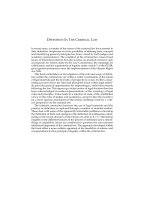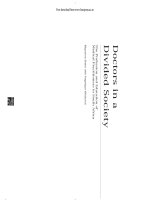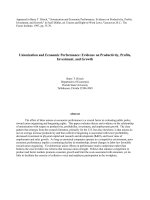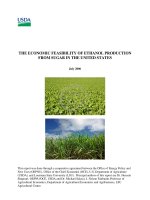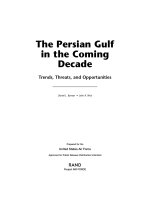STATE LIABILITY IN INVESTMENT TREATY ARBITRATION docx
Bạn đang xem bản rút gọn của tài liệu. Xem và tải ngay bản đầy đủ của tài liệu tại đây (2.34 MB, 461 trang )
STATE LIABILITY IN INVESTMENT TREATY ARBITRATION
Today there are more than 2,500 bilateral investment treaties (BITs)
around the world. Most of these investment protection treaties offer for-
eign investors a direct cause of action to claim damages against host-states
before international arbitral tribunals. This procedure, together with the
requirement of compensation in indirect expropriations and the fair and
equitable treatment standard, have transformed the way we think about
state liability in international law.
We live in the BIT generation, a world where BITs define the scope and
conditions according to which states are economically accountable for the
consequences of regulatory change and administrative action. Investment
arbitration in the BIT generation carries new functions which pose
unprecedented normative challenges, such as the arbitral bodies estab-
lished to resolve investor/state disputes defining the relationship between
property rights and the public interest. They also review state action for
arbitrariness, and define the proper tests under which that review should
proceed.
State Liability in Investment Treaty Arbitration is an interdisciplinary
work, aimed at academics and practitioners, which focuses on five key
dimensions of BIT arbitration. First, it analyses the past practice of state
responsibility for injuries to aliens, placing the BIT generation in historical
perspective. Second, it develops a descriptive law-and-economics model
that explains the proliferation of BITs, and why they are all worded so sim-
ilarly. Third, it addresses the legitimacy deficits of this new form of dis-
pute settlement, weighing its potential advantages and democratic
shortfalls. Fourth, it gives a comparative overview of the universal tension
between property rights and the public interest, and the problems and
challenges associated with liability grounded in illegal and arbitrary state
action. Finally, it presents a detailed legal study of the current state of BIT
jurisprudence regarding indirect expropriations and the fair and equitable
treatment clause.
Volume 26 in the series Studies in International Law
(A) Montt Prelims 10/11/09 12:45 Page i
Studies in International Law
Volume 1: Between Light and Shadow: The World Bank, the International
Monetary Fund and International Human Rights Law Mac Darrow
Volume 2: Toxics and Transnational Law: International and European Regulation
of Toxic Substances as Legal Symbolism Marc Pallemaerts
Volume 3: The Chapter VII Powers of the United Nations Security Council Erika
de Wet
Volume 4: Enforcing International Law Norms Against Terrorism Edited by
Andrea Bianchi
Volume 5: The Permanent International Criminal Court Edited by Dominic
McGoldrick, Peter Rowe and Eric Donnelly.
Volume 6: Regional Organisations and the Development of Collective Security
Ademola Abass Volume 7: Islamic State Practices, International Law and the
Threat from Terrorism: A Critique of the ‘Clash of Civilizations’ in the New
World Order Javaid Rehman
Volume 8: Predictablity and Flexibility in the Law of Maritime Delimitation
Yoshifumi Tanaka
Volume 9: Biotechnology and International Law Edited by Francesco Francioni and
Tullio Scovazzi
Volume 10: The Development of Human Rights Law by the Judges of the
International Court of Justice Shiv Bedi
Volume 11: The Environmental Accountability of the World Bank to Third Party
Non-State Actors Alix Gowlland-Gualtieri
Volume 12: Transnational Corporations and Human Rights Edited by Olivier De
Schutter
Volume 13: Biotechnologies and International Human Rights Edited by Francesco
Francioni
Volume 14: Human Security and International Law: Prospects and Problems
Barbara Von Tigerstrom
Volume 15: The Arms Trade and International Law Zeray Yihdego
Volume 16: Africa: Mapping New Boundaries in International Law Edited by
Jeremy Levitt
Volume 17: Forced Migration, Human Rights and Security Edited by Jane
McAdam
Volume 18: The Use of Nuclear Weapons and the Protection of the Environment
during International Armed Conflict Erik Koppe
Volume 19: The Shifting Allocation of Authority in International Law: Considering
Sovereignty, Supremacy and Subsidiarity Edited by Tomer Broude and Yuval
Shany
Volume 20: Counterterrorism: Democracy’s Challenge Edited by Andrea Bianchi
and Alexis Keller
Volume 21: Amnesty, Human Rights and Political Transitions Louise Mallinder
Volume 22: Property Rights and Natural Resources Richard Barnes
Volume 23: Human Dignity and the Foundations of International Law Patrick
Capps
Volume 24: Sovereignty and the Stateless Nation: Gibraltar in the Modern Legal
Context Keith Azopardi
Volume 25: The International Court of Justice and Self-Defence in International
Law James A Green
(A) Montt Prelims 10/11/09 12:45 Page ii
State Liability in
Investment Treaty
Arbitration
Global Constitutional and
Administrative Law in the BIT
Generation
Santiago Montt
OXFORD AND PORTLAND, OREGON
2009
(A) Montt Prelims 10/11/09 12:45 Page iii
Published in North America (US and Canada) by
Hart Publishing
c/o International Specialized Book Services
920 NE 58th Avenue, Suite 300
Portland, OR 97213-3786
USA
Tel: +1-503-287-3093 or toll-free: (1)-800-944-6190
Fax: +1 503 280 8832
E-mail:
Website: www.isbs.com
© Santiago Montt 2009
Santiago Montt has asserted his right under the Copyright, Designs and Patents Act 1988,
to be identified as the author of this work.
All rights reserved. No part of this publication may be reproduced, stored in a retrieval
system, or transmitted, in any form or by any means, without the prior permission of
Hart Publishing, or as expressly permitted by law or under the terms agreed with
the appropriate reprographic rights organisation. Enquiries concerning reproduction
which may not be covered by the above should be addressed to Hart Publishing at the
address below.
Hart Publishing, 16C Worcester Place, Oxford, OX1 2JW
Telephone: +44 (0)1865 517530 Fax: +44(0)1865 510710
E-mail:
Website:
British Library Cataloguing in Publication Data
Data Available
ISBN: 978-1-84113-856-5
Typeset by Hope Services, Abingdon, Oxon
Printed and bound in Great Britain by
TJ International Ltd, Padstow, Cornwall
(A) Montt Prelims 10/11/09 12:45 Page iv
For Alejandra, Violeta, and Matilde
(A) Montt Prelims 10/11/09 12:45 Page v
(A) Montt Prelims 10/11/09 12:45 Page vi
Foreword
The international investment regime has changed dramatically in recent
decades. Emerging economies throughout the world are attracting foreign
direct investment (FDI) that goes beyond the traditional concentration on
natural resources and agricultural products. Infrastructure projects and
manufacturing for export and for the domestic market account for an
important share of FDI. Furthermore, a growing share involves contracts
or joint ventures between multinational corporations (MNCs) and domes-
tic firms, rather than the state. Although the global economic slowdown
has had an important negative impact on emerging economies worldwide,
a key role for foreign capital and, in particular, for FDI will remain. In the
face of overall declines in investment spending, competition for the
remaining private funds will be intense.
Multi-national investors can no longer view emerging economies as
passive recipients of whatever benefits investors wish to bestow or as
dominated by corruptible leaders willing to make deals for personal gain.
Of course, corruption and self-dealing remain in some quarters and are
facilitated by long-standing MNC business practices. However, the
strengthening of democratic regimes worldwide acts as a check on unfet-
tered deal-making and has introduced demands for political accountabil-
ity into the international investment environment. These demands,
however, are rising to prominence just as more and more investment pro-
jects are essentially private arrangements that require state acquiescence
but no direct state financial participation. The state may give tax breaks,
low-interest loans, and regulatory exemptions, but it does not have an
ownership stake. Even when the FDI is part of a counter-part investment
surrounding a military contract, it nominally may be a private deal. Even
when the state has an ownership stake, it may be unable to control man-
agement decisions.
The tension between rising democratic demands and growing private
FDI comes into focus in Santiago Montt’s major study of Bilateral
Investment Treaties (BITs). Montt argues that the rise of BITs to over 2500
worldwide represents a major shift in investor-state relations in develop-
ing and emerging economies worldwide.
BITs and the investment chapters of free trade agreements govern the
relationships between investors from wealthy countries and host states.
They are most commonly signed between wealthy countries and develop-
ing or emerging economies where investors believe that the host coun-
tries’ legal regimes lack key protections. Many low income countries have
(A) Montt Prelims 10/11/09 12:45 Page vii
also signed BITs with each other, but they account only for a small share
of world FDI volume. Although firms’ contractual relations are increas-
ingly with private firms, BITs frame that relationship by imposing obliga-
tions on host states that limit their ability to interfere with investors’
expectations. A key aspect of most BITs is the ability of private firms to
trigger their enforcement by bringing cases before the World Bank’s arbi-
tration facility, the International Center for the Settlement of International
Disputes (ICSID). Hence, private firms can initiate actions to enforce these
treaties even if the MNCs’ home countries are not supportive. This feature
provides extra benefits to MNCs and can encourage them to invest in
otherwise risky environments, but it also can challenge the political inde-
pendence of host countries struggling to create modern, democratic states.
For a state that is both an emerging economy and an emerging democracy
conflicts may arise between investors’ interest in preserving a favorable
status quo and popular demands for more effective regulation; better,
increased tax-financed infrastructure and social services; and investments
that generate and preserve jobs.
Montt’s ambitious and wide-ranging study of Bilateral Investment
Treaties takes on these fundamental issues and recommends a balanced
resolution. He links important issues in international investment law with
the domestic political legitimacy of an accountable administrative law sys-
tem. Montt asks whether international treaties, especially Bilateral
Investment Treaties (BITs), limit the ability of emerging democracies to
make domestic policy that may impose costs on international investors.
He makes empirical claims about the way in which the BIT’s regime oper-
ates, in practice, and develops his own normative arguments about how
the BIT’s regime ought to develop in order to balance concerns for state
sovereignty and regulatory reform against the encouragement of inter-
national investment. Montt draws on a deep and extensive knowledge of
the way the BIT’s regime operates and the way disputes are resolved
through arbitration.
Montt claims that the growing BIT’s regime is creating bandwagon or
network effects. As experience with BITs grows, a specialized bar has
arisen to deal with disputes. These lawyers, acting as both advocates and
arbitrators, are playing a key role in interpreting poorly defined terms that
recur in many treaties, most of which originate in model treaties drafted
by countries whose firms are prominent source of FDI. Over time, this
developing expertise encourages more and more countries to sign BITs
and enhances their value by removing a source of uncertainty. At the same
time, the increasing coverage of BITs means that a country that signs a
treaty does not stand out as an especially attractive locale for investment
because all if its competitors also have signed BITs. True, those outside the
regime are disadvantaged, but those in the regime are in an increasingly
competitive situation. Nevertheless, if Montt is correct that learning over
viii Foreword
(A) Montt Prelims 10/11/09 12:45 Page viii
time lowers costs for investors, the regime has the character of a focal point
that will be stable even in the face of serious problems with the way it
operates in practice.
In this regard, Montt worries that ICSID arbitral tribunals will interpret
the treaties in a way that is too close to the rules of private contract law.
The arbitrator may not take account of the character of BITs as treaties
between sovereign states that ought to be accountable to their citizens over
time. He argues that international investors should not be protected
against broad-based domestic policy shifts. His standard is the operation
of takings law in wealthy, developed countries; in his view, international
investors should have no greater protections abroad than they have at
home. This seems an eminently sensible position, but one that would
require arbitral tribunals to move beyond a focus on international law
jurisprudence to examine domestic constitutional texts. Perhaps it is also
a call for broadening the personnel of such tribunals to include some who
specialize in constitutional law, especially with respect to the protection of
property rights and role of the state as regulator and taxing authority.
States with constitutionally mandated takings clauses, which require com-
pensation for the expropriation of private property, nevertheless, both
regulate and tax. Laws limit discharges of pollutants, control workplace
health and safety, and affect the risk of products. The law requires busi-
nesses to comply without obtaining compensation for lost profits. There is
no constitutional right to impose risks and other costs on society.
Similarly, taxes are constitutionally permitted that reduce profits and raise
prices. In Montt’s view arbitrators’ interpretations of BITs needs to recog-
nize and accept constitutionally-permitted policymaking and use the
more well-developed jurisprudence of MNCs home countries as a guide-
line or benchmark. This observation is particularly important once one
recognizes that emerging democracies often must engage in massive
amounts of law reform to bring their systems up to date. Thus FDI will
often occur in a very dynamic environment, and investors would be naïve
to suppose that the current inherited pattern of laws will remain frozen in
place. They will likely benefit from some legal reforms that improve the
operation of courts and bureaucracies and that clarify the rules, but they
can also expect other reforms to impose costs. Investors should not be able
to use BITs to pick and choose—benefiting from some reforms and gain-
ing exemption from others.
Mont argues that international investment law can and should have an
impact on the domestic legal and political systems in host countries. He is
optimistic about the ‘halo effect’ of international investment law insofar as
it can equalize the position of foreign and domestic investors by improv-
ing the status of the latter. International investment law should help
emerging economies develop their own regulatory takings jurisprudence
without imposing rigid rules that could prevent policy innovation in such
Foreword ix
(A) Montt Prelims 10/11/09 12:45 Page ix
countries. It should aim to improve the position of domestic investors con-
sistent with democratic values, not undermine local initiative and local
democracy.
Montt’s study is a comprehensive and thoughtful contribution to the
ongoing debates over foreign direct investment and bilateral investment
treaties in particular. Practitioners in the field will add to their knowledge
of the area and find many issues to debate. In addition, Montt has opened
up a new area of study and concern for those interested in the develop-
ment of constitutional and administrative law in emerging democracies
worldwide. Henceforth, comparative constitutional and administrative
law will need to take account of the way the international investment
regime interacts with domestic political and policy imperatives.
Susan Rose-Ackerman
Yale University
New Haven CT
July 15, 2009
x Foreword
(A) Montt Prelims 10/11/09 12:45 Page x
Acknowledgements
This book is a revised and updated version of the JSD dissertation that I
wrote at Yale Law School between 2004 and 2006. I came to Yale in 2003,
to pursue a Masters’ and Doctorate in administrative law and regulation.
Prior to this, I had practised law in Chile, where my work primarily
involved defending domestic and foreign companies against government
measures, particularly in the fishing industry, which was one of the most
heavily regulated industries in the country.
During my first semester as an LLM, I stumbled across the Metalclad
award.
1
Being completely ignorant at that time on the subject of invest-
ment treaties and their system of investor–state arbitration, I was stunned.
My immediate reaction was to realise that several of the disputes that I
previously handled in Chilean courts—and, of course, many similar
ones—would now be litigated before arbitral tribunals pursuant to invest-
ment treaty standards.
In addition, the administrative legal scholar in me reacted with deep
shock at the reasoning and tone of the award. Although I did not disagree
with the outcome itself, many of the arguments adopted by the Tribunal
would not have been remotely possible for plaintiffs suing government
under any Western public law tradition. Moreover, the Tribunal tended to
disregard domestic law, effectively downplaying the importance it
deserved in this case. More importantly, in the award, I could not find the
deferential and modest attitude normally displayed by public law judges
who review decisions made by the political branches of government.
I am neither ‘pro-state’ nor ‘pro-investor’. Instead, I would like to
describe myself as ‘pro-appropriate equilibrium’. In fact, in terms of my
background if anything I would be more on ‘pro-investor’ side: just before
beginning my graduate studies at Yale, I wrote a book on administrative
law, galvanised by the consistently poor treatment that a foreign investor,
in whose defence I participated, received at the hands of a public entity.
This book was designed with the purpose of clarifying and resolving sev-
eral inadequacies that I found in the Chilean legal system.
2
The important point is that I had the impression, while reading the
Metalclad award and later confirmed from other decisions, that inter-
national investment law was failing to seriously take into account the
1
Metalclad Corporation v Mexico, ICSID Case No ARB(AF)/97/1 (Lauterpacht, Civiletti,
Siqueiros), Award (30 August 2000).
2
Santiago Montt, El Dominio Público. Estudio de su Régimen Especial de Protección y Utilización
(Santiago de Chile, Conosur-Lexis, 2002).
(A) Montt Prelims 10/11/09 12:45 Page xi
enormous reservoir of human experience that had accumulated over
many decades, at the domestic level. This struck me as a significant
oversight, since domestic public law generally possesses a much more
refined conceptual framework than international law for dealing with the
problems that typically arise in the confrontation between private inter-
ests and the public good.
I decided, then, to embark upon a project that would examine invest-
ment treaty arbitration against the more well-established background of
domestic constitutional and administrative law. My ultimate purpose—
which I hope the reader may appreciate throughout the present book—
was and continues to be to contribute to the development of an investment
treaty jurisprudence characterised by moderation and deference, in which
the interests and expectations of foreign investors will be properly bal-
anced against the regulatory state’s exercise of its powers.
Given this agenda, it should come as no surprise that this book does not
follow what has become the canon in international investment law. A brief
scanning of the table of contents will undoubtedly reveal that the book
provides an alternative, multidisciplinary approach to the subject, incor-
porating historical, economic and legal analysis that places a strong
emphasis on issues of constitutional law and expropriations, and of
administrative law and arbitrariness.
I had the privilege of working on this project at three of the most intel-
lectually stimulating and vibrant places that a legal scholar can possibly
find: Yale Law School, Columbia Law School, and the Woodrow Wilson
School of Public and International Affairs at Princeton University. I would
like to generally thank all of the people who work at these three institu-
tions, and in particular, their librarians and library personnel.
I am particularly indebted to Yale, my graduated alma mater, for deeply
changing the way in which I understand the law and its relationship to
other social sciences. Professor Susan Rose-Ackerman was the most
inspiring and generous supervisor that a JSD student could wish to have,
and Professor Michael Reisman served as an endless source of knowledge
and wisdom. Professor Michael Levine introduced me to public choice
and positive approaches to economic regulation. I am grateful for all the
hours spent on this project by such talented people, as well as the volumi-
nous number of insights and perspectives that they offered me.
At Yale, I also wish to thank Professors George Priest, Rudolf Dolzer
and Amy Chua; and my classmates and colleagues Mariana Mota, Maciek
Kisilowski, Yoon-Ho Alex Lee, Laura Saldivia, and Johanna Kalb. At
Columbia Law School, I would like to thank Sylvia T Polo, the Dean of
Graduate Legal Studies. At Princeton University, I am indebted to
Professors Kim Scheppele, Ingolf Pernice, and George Bustin; and to my
classmates and fellows Dan Firger, Matt Jacobs, Nick Poletti, Scott
Withrow, Julien Jeanneney, and Mareike Kleine.
xii Acknowledgements
(A) Montt Prelims 10/11/09 12:45 Page xii
I would also like to thank the participants of the New York University
GAL project held in Buenos Aires, Professor Richard Stewart, Benedict
Kingsbury, and Katrina Wyman; my hosts in Madrid during August, 2005,
Professor Gaspar Ariño, and the Fundación de Estudios de la Regulación;
Professor Matthew Mirow; my good friend María José Poblete; and two
anonymous readers from Hart Publishing. Special thanks to Rachel
Turner and Mel Hamill at Hart, for their patience; to Christopher Schuck,
my proofreader, who supplied prompt and deft assistance with respect to
my limited English; to my former bosses and friends at Weil, Gotshal and
Manges, Guillermo Aguilar-Alvarez, Eric Ordway, and Chip Roh, for the
many hours spent discussing the various dimensions of investment treaty
arbitration; and, finally, to Ramón Vergara Grez for his generosity in
authorising me to use his painting ‘Carta Abierta a Europa’—undoubtedly
one of the most important Chilean artworks of the 20th century—which
can be fully appreciated on the back cover of this book.
Writing any book in the midst of other work and study is a selfish act.
Without the support of my wife Alejandra, and the inspiration of my
daughters Violeta and Matilde, this would have been impossible. If there
is any specific expropriation which they have come to know while I worked
on this project, it is that their husband and dad has been taken to the
library. In return—though this constitutes far from prompt, adequate, and
effective compensation—I dedicate this book to them, with love.
Of course, in the midst of all this tremendous help and support, all faults
and errors are exclusively mine.
Princeton
1 March 2009
Acknowledgements xiii
(A) Montt Prelims 10/11/09 12:45 Page xiii
(A) Montt Prelims 10/11/09 12:45 Page xiv
Table of Contents
Foreword vii
Acknowledgements xi
Table of Cases xxi
Table of Legislation xxxv
Table of International Agreements and Draft International
Agreements xxxix
Introduction 1
First Part: A Framework of Analysis 29
Chapter 1: The Latin American Position on State Responsibility.
Looking into the Past for Lessons on the Future 31
Introduction: The Latin American Struggle against Diplomatic
Protection 31
I The Calvo Doctrine and Clause: Two Nineteenth Century
Anti-Diplomatic Protection Institutions 35
A The Practice of Diplomatic Protection in the Nineteenth
Century 36
B The Calvo Doctrine 38
C The Calvo Clause 45
II The End of Gunboat Diplomacy 48
III
From the Calvo Doctrine to Expropriation Without
Compensation
55
IV International Minimum Standards Strike Back 62
V Updating the Calvo Doctrine in the BIT Generation 74
Conclusions: Building a Normative Stance Based on Equality 80
Chapter 2: The BIT Generation’s Emergence as a Collective Action
Problem. Prisoner’s Dilemma or Network Effects? 83
Introduction: Why Do Developing Countries Sign BITs? 83
I The BIT Generation as a Prisoner’s Dilemma 87
II Weak Competition and Network Effects 90
III A Formal Model of the BIT Generation as a Virtual Network 96
IV Evidence of the BIT Generation as a Virtual Network 104
A Five Structural Arguments 104
B Positive Externalities of the BIT System 112
(A) Montt Prelims 10/11/09 12:45 Page xv
V Providing answers for critical questions 115
Conclusions. Normative Implications of the Virtual Network
Theory of the BIT Generation 122
Chapter 3: Trading Off Sovereignty for Credibility: Questions of
Legitimacy in the BIT Generation 125
Introduction: Legitimacy in International Investment Law 125
I The Legitimacy Problem: Ad Hoc International Arbitral
Tribunals Discharging a Preservationist
Constitutional Function 128
A International Law as Governance 129
B Governing with Judges 133
C Ad Hoc International Arbitral Tribunals Discharging a
Preservationist Constitutional Function 135
II Assessing Potential Sources of Legitimacy 141
A Consent Legitimacy 141
B Output Legitimacy 144
C Exit Legitimacy 145
D Rule of Law Legitimacy 146
E Institution-Building Legitimacy 154
III
Diversifying Risks in the BIT Lottery: Why an Appellate Body or
an International Investment Court is Not the Solution 155
Conclusions: Future of the BIT Generation 159
Second Part: An Assessment of the Present State of Investment
Treaty Arbitration Jurisprudence 163
Chapter 4: Property Rights v The Public Interests: A Comparative
Approach to a Global Puzzle 165
Introduction: Risks and Benefits of Building a Comparative
Patchwork 165
I Understanding the Intertwined Relationship of Property
Rights and Regulation 168
II The Core v The Public Interest: Hopeless Attempts to Escape
Fully from Balancing 177
A Property Rights-at-the-Core as Fundamental Rights 177
B The Gateway Question of the Core 184
C the Denominator Problem and Conceptual Severance 188
D Termination of Property Rights without Compensation 191
III The Periphery v the Public Interest: The Muddied Waters of
Complex Balancing 198
xvi Table of Contents
(A) Montt Prelims 10/11/09 12:45 Page xvi
A The Protection of Property Rights’ Periphery: Expropriations
and Responsabilité de l’État 199
B Arbitrariness as Illegality 200
C Arbitrariness as Irrationality 206
D Arbitrariness as Special Sacrifice 213
E Arbitrariness as Lack of Proportionality (stricto sensu)216
F Legitimate Expectations 222
Conclusions. Three Lessons from Comparative Law for International
Investment Law 227
Chapter 5. Investments, Indirect Expropriations and the
Regulatory State 231
Introduction: Why is Recognsing Indirect Takings So Difficult? 231
I Investments and Indirect Expropriations as Global
Constitutional Law: New Limits for States’ Police Powers 236
A The Investment-Expropriation Relationship in Investment
Treaties as a Global Constitutional Law Problem 237
B A ‘Patterning Definition’ Approach to the Concept of
Investment 243
C Does the Definition of Investment Play a Substantive Role? 251
II The Rule of Thumb: Indirect Expropriations as Total or
Substantial Deprivations 253
A The ‘Sole Effects’ Doctrine in Indirect Expropriations:
Total or Substantial Deprivations 254
B What is Substantial Deprivation? 261
C The Denominator Problem in Investment Treaty Disputes 265
III Are There Total or Substantial Deprivations That Do Not
Qualify as Expropriations? 273
A Exceptions I: Termination of Investment in Accordance
with the Law 274
B Exceptions II: Pre-eminent Public Interests 277
C Counter-Exceptions: Arbitrariness and Fair and Equitable
Treatment Considerations in Expropriation Claims 281
Conclusions: Fearing Ad Hocism More than an Excessively
Extensive Concept of Expropriations 288
Chapter 6: Controlling Arbitrariness through the Fair and
Equitable Standard 293
Introduction: Arbitrariness in International Investment Law 293
I The Current Debate in International Investment Law: The
Alleged Autonomous Character of the FET Standard 298
Table of Contents xvii
(A) Montt Prelims 10/11/09 12:45 Page xvii
A The Challenge of the FET Standard: Defining a New
Standard of Review 299
B A New Standard Under Traditional Methods: FET and Treaty
Interpretation under Articles 31 and 32 of the Vienna
Convention 303
C
IMS as a Methodological Constraint over Arbitral Tribunals
307
II A General Framework of Analysis: Finding the Essential
Dimensions of a GAL Approach to the FET Standard 310
III The First Dimension of the GAL Approach to the FET
Standard: The Legal System Falling Below IMS as the Basis
of International Wrongfulness 318
IV The Second Dimension of the GAL Approach to the FET
Standard: Domestic Illegalities as the Basis of
International Wrongful Acts 323
A The Non-Courts of Appeal Doctrine 324
B Extent of Domestic Judicial Review 326
i First Option: Remanding Cases to Domestic Courts:
The Rebirth of the Local Remedies Rule 327
ii Second Option: Reviewing Illegality, Irrationality,
Special Sacrifice, and Lack of Proportionality in
Accordance with Domestic Law 329
iii Third Option: Reviewing Only Illegality in Accordance
with Domestic Law 330
C Standards of Review of Questions of Law 332
i First Option: Transposing Denial of Justice Age
Standards to the BIT Generation: The ‘Manifestly
Unjust’ Standard 333
ii Second Option: Municipal Law as Facts: De Novo
Review 334
iii Third Option: The Same Level of Deference That Is
Generally Applied by Domestic Courts 337
D The ‘Something More’ Doctrine 338
V The Third Dimension of the GAL Approach to the FET
Standard: Arbitrariness and the Control of
Discretionary Powers 342
A The Perils of Process-Based Heightened Scrutiny and
Object and Purpose Interpretation 343
B Due Process: Administrative Denial of Justice 348
C Arbitrariness as Irrationality 351
i Ends and Legitimate State Interests 351
ii Means and Their Relationship to Ends 354
xviii Table of Contents
(A) Montt Prelims 10/11/09 12:45 Page xviii
D Arbitrariness as Special Sacrifice and Lack of
Proportionality (Stricto Sensu)355
E Legitimate Expectations 359
i Without Assurances 360
ii With Assurances 362
Conclusions: The Horizontal and Vertical Constraints on the FET
Standard 366
Conclusions: Future of the BIT Generation: For a Global Legal Order
Committed to the Rule of Law and Human Welfare 369
Bibliography 375
Index 405
Table of Contents xix
(A) Montt Prelims 10/11/09 12:45 Page xix
(A) Montt Prelims 10/11/09 12:45 Page xx
Table of Cases
Anglo–Chilean Tribunal of Arbitration
Nitrate Railways Co Ltd (UK) v Chile, 2 Reclamaciones presentadas
al Tribunal Anglo-Chileno (Santiago de Chile, Imprenta i libreria
Ercilla, 1896) 47
Canada
United Mexican States v Metalclad Corp (2001) 89 BCLR 359 260
Chile
Requerimiento de Diputados con el Objeto de que se Declare la
Inconstitucionalidad del Estatuto de Roma de la Corte Penal
Internacional, adoptado en dicha ciudad et 17 de Julio de 1998,
Case No 346, Tribunal Constitutional de Chile) (Constitutional
Court of Chile) (8 April 2002) 143
European Court and Commission of Human Rights
AGOSI v UK (App no 9118/80) (1986) 9 EHRR 1 193, 220–21, 274
Antonetto v Italy (App no 15918/89) (2003) 36 EHRR (10) 120 179, 205
Belvedere Alberghiera SRL v Italy (App no 31524/96) ECHR
2000–VI 135 205
Beyeler v Italy (App no 33202/96) (2001) 33 EHRR 1224 205, 207, 220
Carbonara and Ventura v Italy (App no 24638/94) ECHR
2000–VI 93 205
Chassagnou and Others v France (App nos 25088/94, 28331/95 and
28443/95) (1995) 29 EHRR 615 190, 207
Former King of Greece v Greece (App no 25701/94) (2001)
33 EHRR 516 205
Fredin v Sweden (App no 12033/86) (1991) 13 EHRR 784 190
Handyside v UK (1976) 1 EHRR 737 221
Iatridis v Greece (App no 31107/96) (2000) 30 EHRR 97 205
Immobiliare Saffi v Italy (1990) 30 EHRR 756 220–21
(A) Montt Prelims 10/11/09 12:45 Page xxi
James and Others v UK (App no 8793/79) (1986)
8 EHRR 123 207, 215–16, 220–21, 345
Matos E Silva Lda v Portugal (App no 15777/89 (1997)
24 EHRR 573 186, 255
Pressos Compania Naviera SA and Others v Belgium
(App no 17849/91) (1996) 21 EHRR 301 207, 220, 244
Ryder v UK (App no 12360/86) (1987) 11 EHRR 80 193
Saffi. See Immobiliare Saffi v Italy
Sporrong and Lönnroth v Sweden (App nos 7151/75 and 7152/75)
(1983) 5 EHRR 35 179–80, 186, 220–21, 238, 255
Tre Traktörer Aktiebolag v Sweden (App no 10873/84) (1989)
13 EHRR 309 190
European Court of Justice and Court of First Instance
Aktien–Zuckerfabrik Schöppenstedt v Council (Case 5/71) [1971]
ECR 975 204
Atlanta AG and Others v Council (Case T–521/93) [1996] ECR
II–1707 225
Bayerische HNL and Others v Council and Commission (Case 83/76)
[1978] ECR 1209 171
Candiotte (Elena) v Council (Case T–108/94) [1996] ECR II–87 205
Chomel (Jean–Louis) v Commission (Case T–123/89) [1990] ECR
II–131 225
CNTA v Commission (Case 74/74) [1975] ECR 533 224
Consorzio gruppo di azione locale `Murgia Messapicá’ v Commission
(Case T–465/93) [1994] ECR II–361 225
De Boer Buizen BV v Council and Commission (Case 81/86) [1987]
ECR 3677 214
Dorsch Consult v Council and Commission (Case C–237/98) [2000]
ECR I–4549 214
Edeka Zentrale AG v Germany (Case 245/81) [1982] ECR 2745 224
Fabbrica italiana accumulatori motocarri Montecchio Spa (FIAMM)
et al (Cases C–120/2006P and C–121/2006P) [2008] ECR I–6513 214
Faust (W) v Commission (Case 52/81) [1982] ECR 3762 224
Firma Anton Dürbeck v Hauptzollamt Frankfurt am Main–Flughafen
(Case 112/80) [1981] ECR 1095 226
Geotronics SA v Commission (Case C–395/95) [1997] ECR I–2271 205
Hauptzollamt Krefeld v Maizena GmbH (Case 5/82) [1982] ECR 4602 225
Ireks–Arkady GmbH v Council and Commission (Case 238/78) [1979]
ECR 2955 204
Kingdom of Spain v Council (Case C–284/94) [1988] ECR I–7309 224
Lefebvre v Commission (Case T–571/93) [1995] ECR II–2379 225
xxii Table of Cases
(A) Montt Prelims 10/11/09 12:45 Page xxii
Mulder v Minister van Landbouw en Visserij (Case 120/86) [1988]
ECR 2321 224
R v MAFF, ex p Fedesa (Case C–331/88) [1990] ECR I–4023 208, 216
Société Anonyme a Participation Ouvrière Compagnie Nationale Air
France v Commission (Case T–2/93) [1994] ECR II–323 225
Société nouvelle des usines de Pontlieue – Aciéries du Temple (SNUPAT) v
High Authority of the European Coal and Steel Community (Cases 42/59
and 49/59) [1961] ECR 53 (English Spec Ed) 225
Van den Bergh en Jurgens v Commission (Case 265/85) [1987] ECR
1155 225
Zaninotto (Galileo) v Ispettorato Centrale Repressione Frodi and Others (Case
C–375/96) [1998] ECR I–6629 224
France
Compagnie general de la Grande Pêche, Conseil d’Etat, 14 January 1938 195
Institut technique de Dunkerque, Conseil d’Etat, 25 April 1980 212
Rouillon, Conseil d’Etat, 14 December 1984 195
Ste des Ets Aupinel et autres, Conseil d’Etat, 8 January 1965 195
Ste Stambouli, Conseil d’Etat, 11 July 1990 195
Société anonyme des produits laitiers `La Fleurette’, Conseil d’Etat,
14 January 1938 212
Société Charron et cie, Conseil d’Etat, 10 March 1940 195
Ville de Paris v Driancourt, Conseil d’Etat, 26 January 1973 204
Germany
Gravel Decision, BVerGE 58, 300 (1981) 243
Naßauskiesung case, Federal Constitutional Court 196
Right of Pre–Emption Case, Constitutional Court, BVerGE 83, 201
(1991) 197, 281
Investment Arbitration
ICSID
ADC Affiliate Ltd et al v Hungary, ICSID Case No ARB/03/16,
Award (2 October 2006) 5, 107, 150, 285, 352–53
ADF Group Inc v US, ICSID Case No ARB(AF)/00/1, Award
(9 January 2003) 308–9, 321, 324, 338–39, 346, 359
AES Corporation v Argentine, ICSID Case No ARB/02/17, Decision on
Jurisdiction (26 April 2005) 107
Table of Cases xxiii
(A) Montt Prelims 10/11/09 12:45 Page xxiii
Archer Daniels Midland Co et al v Mexico, ICSID Case No ARB(AF)
/04/05, Award (21 November 2007) 255, 262, 264, 282
Asian Agricultural Products Ltd v Sri Lanka, ICSID Case No ARB/87/3,
Award (27 June 1990) 2, 21, 84
Azinian v Mexico, ICSID Case No ARB(AF)/97/2, Award (1 November
1999) 160, 276, 294, 318–19, 334
Azurix Corp v Argentina, ICSID Case No ARB/01/12, Award
(14 July 2006) 232, 264, 271, 298, 301–2, 305, 341
Bayindir Insaat Turizm Ticaret Ve Sanayi Afi v Pakistan, ICSID
Case No ARB/03/29, Decision on Jurisdiction (14 November
2005) 107, 247, 338
Bayview Irrigation District et al v Mexico, ICSID Case No ARB
(AF)/05/1, Award (19 June 2007) 251
Biwater Gauff (Tanzania) Ltd v Tanzania, ICSID Case No ARB/05/22,
Award (24 July 2008) 150, 262, 277, 285, 298, 302,
305, 310, 314–15, 323, 342, 359–60
Casado (Victor Pey) et al v Chile, ICSID Case No ARB/98/2,
Award (8 May 2008) 107
CMS Gas Transmission Co v Argentina, ICSID Case No ARB/01/08,
Award (12 May 2005) 160, 259, 263, 299, 302, 322, 345, 359, 361, 364
Compañía de Aguas del Aconquija SA et al v Argentina (Vivendi I),
ICSID Case No ARB/97/3, Award (21 November 2000) 313, 327–28
Compañía de Aguas del Aconquija SA et al v Argentina (Vivendi II),
ICSID Case No ARB/97/3, Decision on Annulment
(3 July 2002) 311, 314, 327
Compañía de Aguas del Aconquija SA et al v Argentina (Vivendi III),
ICSID Case No ARB/97/3, Award (20 August 2007) 254, 256,
264, 271, 298, 314, 341
Compañía del Desarrollo Santa Elena SA v Costa Rica, ICSID
Case No ARB/96/1, Award (17 February 2000) 259, 279
Consortium RFCC v Morocco, ICSID Case No ARB/00/6, Award
(22 December 2003) 262, 271, 341
Continental Casualty Co v Argentina, ICSID Case No ARB/03/9,
Award (5 September 2008) 238, 296, 323, 361, 363
Desert Line Projects LLC v The Republic of Yemen, ICSID Case
No ARB/05/17, Award (6 February 2008) 150, 247–48, 303
Duke Energy Electroquil Partners and Electroquil SA v Ecuador,
ICSID Case No ARB/04/19, Award (18 August 2008) 107, 298, 323,
339, 341, 360, 362
Enron Corporation and Ponderosa Assets LP v Argentina, ICSID Case
No ARB/01/03, Decision on Jurisdiction (14 January 2004) 137
Enron Corporation and Ponderosa Assets LP v Argentina, ICSID Case
No ARB/01/03, Award (22 May 2007) 148, 263, 298, 301,
304–5, 309, 323, 359, 363
xxiv Table of Cases
(A) Montt Prelims 10/11/09 12:45 Page xxiv



